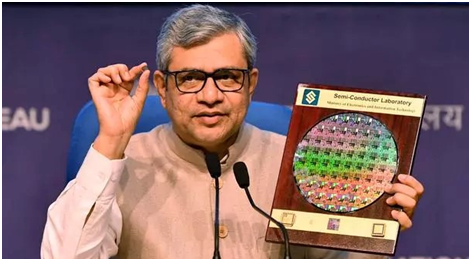
The
Union Cabinet on Thursday 29 Feb approved proposals to set up three
semi-conductor units with an investment of ₹1.26-lakh crore.
Two of
the units will be set up in Gujarat while third one will be in Assam. With
this, India will have four units, with supply from first unit is expected by
year end.
While
Tata group will set up two units – Dholera (Gujarat) and Morigaon (Assam), CG
Power will set up unit at Sanand (Gujarat Further he said that normally
construction takes 3-4 years. However, “we have been able to compress the time
for the Micron Unit and hope to repeat the same for all three plants,” he said.
The units will make chips for sectors
including defence, automobiles and telecommunications and will be set up under the
‘Development of Semiconductors and Display Manufacturing Ecosystem’ programme
that provides government support of up to ₹76,000 crore, out of which ₹59,000
crore to be made available to these four plants.
Tata Electronics Pvt Ltd will set up
a semiconductor fab in partnership with Taiwan‘s Powerchip Semiconductor
Manufacturing Corp at Dholera in Gujarat. The plant will have a capacity to
produce 50,000 wafers per month and involve an investment of ₹91,000 crore.
This will produce high-performance compute chips with 28 nm technology for
electric vehicles, telecom defence, automotive, consumer electronics, display
and power electronics.
Tata
Semiconductor Assembly and Test Pvt Ltd (TSAT) will set up a semiconductor unit
in Morigaon, Assam, at an investment of ₹27,000 crore. This will have a capacity of 48 million per day for automotive,
EVs, consumer electronics, telecom and mobile phones.
CG Power in partnership with Renesas
Electronics Corp and Stars Microelectronics of Thailand will set up a unit in
Sanand in Gujarat at an investment of ₹7,600 crore. The CG power semiconductor
unit will manufacture 15 million chips for consumer, industrial, automotive and
power applications.
Commenting
on Cabinet decision, N Chandrasekaran, Chairman, Tata Sons, said that with AI-led digitisation of every aspect of
human existence, semiconductors will be the most critical building block.
By 2030, global semiconductor industry is expected to grow to $ 1 trillion and
Indian semiconductor demand is expected to cross $110 billion. “India’s entry
in the semiconductor manufacturing will significantly de-risk global supply
chains and will make India a very important player in the global semiconductor
industry,” he said.
In June
last year, the Cabinet approved a proposal of Micron for setting up a
semiconductor unit in Sanand, Gujarat. The approvals are part of the Modi
government’s ambitions to make India a chipmaker for the world and cutting
reliance on countries like Taiwan.